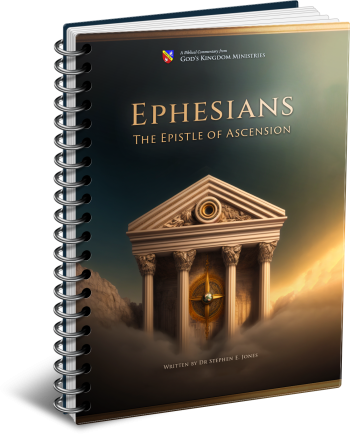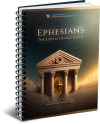Latest Posts
View the latest posts in an easy-to-read list format, with filtering options.

Paul's epistle to the Ephesians is, in some ways, a continuation of his epistle to the Romans. It enlarges upon Romans 1-8 in regard to the believer's position and right standing with God. We are "seated" with Christ, so we must "walk" according to our calling, and "stand" in the full armor of God against those who would oppose us.
Category - Bible Commentaries

Speaking of the believers, Paul writes in Eph. 1:19-21,
19 and what is the surpassing greatness of His power [dunamis] toward us who believe. These [believers] are in accordance with the working of the strength [kratos, “dominion, force, strength”] of His might [ischys, “ability”] 20 which He brought about in Christ, when He raised Him from the dead and seated Him at His right hand in the heavenly places, 21 far above all rule and authority and power and dominion, and every name that is named, not only in this age but also in the one to come.
Here Paul uses three different Greek words, each emphasizing the power and strength of dominion that Christ has been given. By this, Paul makes it clear that the dominion mandate given to Adam in Gen. 1:26 has been passed to Jesus Christ. It is part of the inheritance of the Son, as we read in Heb. 1:13, 14,
13 But to which of the angels has He ever said, “Sit at My right hand until I make Your enemies a footstool for Your feet”? 14 Are they not all ministering spirits, sent out to render service for the sake of those who inherit salvation?
Great and mighty as the angels are, they are not destined to such an inheritance. Christ is THE son; we are sons as well, though not the first born. Even so, our inheritance is greater than that of the angels, who are called to serve us and assist us in obtaining our inheritance.
Christ was raised from the dead, and He ascended to the right hand of God. From this position of authority, He was given the dominion mandate that Adam failed to secure. Adam had received the authority to name the animals (Gen. 2:19). In biblical thought, authority gives the right to name things. Hence, whatever Adam named was under his authority.
This includes Eve, by the way. Prior to sin, Eve was called “woman,” but after sin entered the picture, Adam was given authority, and then Adam named her “Eve” (Gen. 3:20).
We will have more to say about this later in our study.
Shem was given the authority of the birthright by his father, Noah. Shem means “name,” which implies fame, prominence, or authority. So also the Jews often use the term Ha Shem (“The Name”) in place of YHWH.
Christ was given authority over “every name that is named, not only in this age but also in the one to come” (Eph. 1:21). This implies that Christ received the dominion mandate over all of creation, including every generation throughout earth’s history. This dominion (as Paul asserts so often in his epistles) means that He has the right to rule all things and will not be denied this right. He will lose nothing in the end. To put all things under His feet means He will name everyone, identifying every man and woman in their callings and their place in the creative order, so that all will indeed serve Him.
Paul finishes out his thought, saying in Eph. 1:22, 23,
22 And He put all things in subjection under His feet and gave Him as head over all things to the church, 23 which is His body, the fullness of Him who fills all in all.
This assertion is from Psalm 8:6,
6 You make him to rule over the works of Your hands; You have put all things under his feet.
Normally, when Paul expounds on the climax of the ages and the purpose of creation, he quotes or refers to Psalm 8:6. His longest commentary on the meaning of this psalm is found in 1 Cor. 15:25-28,
25 For He must reign until He has put all His enemies under His feet. 26 The last enemy that will be abolished is death. 27 For He has put all things in subjection under His feet. But when He says, “All things are put in subjection,” it is evident that He is excepted who put all things in subjection to Him. 28 When all things are subjected to Him, then the Son Himself also will be subjected to the One who subjected all things to Him, so that God may be all in all.
Here Paul interprets Psalm 8:6 to mean that all of Christ’s “enemies” will become subject to Him. It is not just His friends, nor does it include only believers. Neither does it include only some of His enemies. It includes “all His enemies.”
Among these “enemies” is death itself. When death is put in subjection to Christ, Paul says it will be “abolished.” It does NOT mean that the services of death will be retained in order to torture His enemies forever. Yet we must note that death is “the last enemy that will be abolished.” The popular church teaching is that death will be the first enemy abolished at the resurrection of the dead. They think that the second death (Rev. 20:14) will then take dominion over the vast bulk of humanity and will never be abolished.
But both are called “death,” and therefore both must be abolished in order that all things may be subjected to Christ. The purpose of the second death (which is the “lake of fire”) is to allow time for the “fiery law” (Deut. 33:2, KJV) to judge the flesh and, through judgment, to teach them righteousness (Isaiah 26:9). God’s law is designed to correct sinners, not to destroy them.
To be an enemy of Christ means to be in a state of conflict and disagreement with Him. Human nature itself is the great enemy, for the will of man runs contrary to the will of God. Iniquity is the spawn of death (mortality). Hence, there will always be a part of man’s nature and will that remain at enmity with God until he is given life (immortality). That is why mortality and corruption are overcome at the same time (1 Cor. 15:54).
As long as the second death exists, there will be enemies of Christ. The will of man must be subdued during the final age of judgment. During that time, Paul’s prophecy in 1 Cor. 15:25 will remain unfulfilled. Hence, the day must come—that great Creation Jubilee—when death itself will be abolished, ALL will receive immortality and incorruption, and ALL enemies will be put under the feet of Christ.
Paul tells us that the church, being in agreement with Christ, has been empowered to act as “His body, the fullness of Him who fills all in all” (Eph. 1:23). By Paul’s description, the body of Christ is that portion of creation which has been filled completely with the full nature and authority of Christ. The Emphatic Diaglott reads,
23 which is His body, the full development of Him who is filling all things with all [of His nature].
This seems to be an enlargement on the idea of God being “all in all” (1 Cor. 15:28). The idea describes a completed project, where God fills all of creation with His nature and glory. He does not fill some with all, nor all with some. In the end, there will be nothing else to fill. He will be “all in all,” and Eph. 1:23 says He is “filling all things” with “all” of His own nature and character.
Yet in the interim, the church is supposed to be in that position first. Hence, as long as there is any conflict between the will of God and the will of a believer, this pleroma has not yet reached its full expression. As it turns out, not all believers are in agreement with Christ, nor do all agree with His plan for creation. Many also continue to reject His law, not knowing that the law—His word—is an expression of the nature of God. Hence, they find themselves in conflict with God’s nature.
For this reason, the church has been subdivided into believers and overcomers. Overcomers are those who, after hearing the truth, recognize it as truth, overcoming the will and desire of the flesh. Of course, this often takes time, for the will of the flesh must be overcome over a lifetime of experience and learning until that great day when God fills and glorifies us with all of Himself.